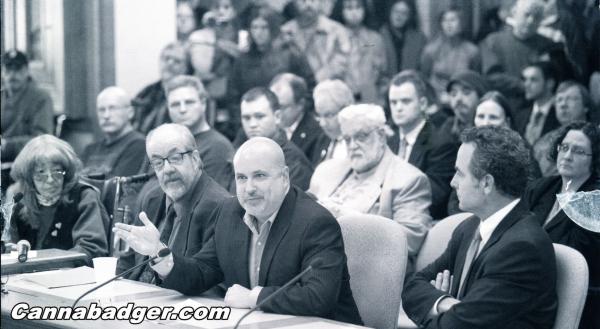In Nov. 2008, Democrats swept into power in Wisconsin, gaining control of both houses of the state legislature with incumbent Gov. Jim Doyle already holding down the executive branch. Rep. Mark Pocan (D-Madison) and Sen. Jon Erpenbach (D-Waunakee) were the sponsors of Assembly Bill 554/Senate Bill 368, the Jacki Rickert Medical Marijuana Act (JRMMA).
With Democrats chairing both health committees, after years of laying the foundation for passage of medical cannabis legislation in Wisconsin, the stage was set for a combined public hearing of the Assembly and Senate health committees. The Assembly Committee on Public Health was chaired by retired neurologist Rep. Chuck Benedict (D-Beloit) and the Senate Committee on Health, Health Insurance, Privacy, Property Tax Relief, and Revenue, chaired by Senator Jon Erpenbach (D-Middleton), senate sponsor of the JRMMA.
The date of the hearing was Dec. 15, 2009, nine years ago today as of this writing. Support from hearing attendees was overwhelming, and media interest high, for the hearing. The entire 8 hour hearing can be viewed online on Wisconsin Eye at: http://www.wiseye.org/Video-Archive/Event-Detail/evhdid/2399 The first people to testify were bill sponsors Pocan and Erpenbach, followed by Jacki Rickert and myself.
“If there was a simpler way, don’t you think it would be much simpler to do it?” Jacki asked,”But there just doesn’t seem to be. Cannabis works best.” Then Assembly-
Rep. Leah Vukmir (R-Wauwatosa) drew boos from attendees when she told Pocan and Erpenbach, “I think what I resent most is this facade that you are putting forth, using people who are dying of cancer or who have other illnesses as your shield. I think it’s nothing more than a ruse for you to move towards full legalization of marijuana.”
Addressing Vukmir directly, Jacki Rickert responded in defense of the two lawmakers saying to Vukmir, “I know you have said you don’t want to put the Assembly through a circus. These wonderful gentleman (Rep. Pocan and Sen. Erpenbach) are trying to save our lives. They aren’t any part of a circus. These people (medical cannabis patients) aren’t part of a circus. They’re real people and they have real problems. This isn’t any back door effort, we all came in through the front door. We’ll all have cards. Everybody will know where it is. This is the right way to do it. It’s all covered. We’re all here. Everything’s in it. We’ll know where it is, it’s got to be this time, this bill, please!”
57 people registered in support, with only one registered against. 48 people testified in support, with only five against, making the final score was 105 to 6. Those five testifying against were Dr. Michael Miller, State Medical Society, Kevin St. John, Wisconsin Department of Justice (DOJ) on behalf of then-Wisconsin Attorney General J.B. Van Hollen, Charles Wood, Wisconsin Narcotics Officer Association, Robert Block, State of Wisconsin Controlled Substances Board and the fifth a private citizen from Madison, Tom Meyer.
The Milwaukee Journal Sentinel reported the DOJ’s Kevin St. John, testifying on behalf of then-Wisconsin AG Van Hollen said, “If the bills are enacted as drafted, law enforcement’s and prosecutors’ ability to enforce what would still be illegal is seriously disabled”.
But law enforcement opinions were mixed. Then-Eau Claire District Attorney Rich White told Eau Claire tv station WEAU that he doesn’t think allowing marijuana to be given legally with a prescription will affect his office’s case load, saying “We’ll deal with the legal consequences but I believe they will be relatively minimal.”
The Medical Society’s Miller, as in previous testimony at earlier hearing, focused on the alleged dangers of smoking cannabis, instead saying it was not a strong painkiller, and patients could use prescription Marinol, an expensive synthetic for of THC. He also urged lawmakers to clear the way for another expensive pharmaceutical form of cannabis, Sativex. But even Dr. Miller’s on record opposition was tempered by statements he made. Responding to a question from Vukmir regarding “gateway drugs”, Dr. Miller identified tobacco, a legal substance, as the number one gateway drug. He also acknowledged not only had Medical Society members not been polled as to their opinions of medical cannabis, but acknowledged, if asked, “you might get a lot of members saying yes”.
While media frequently focused on negative comments from Rep. Vukmir, Dr. Miller and other naysayers, eloquent testimony was heard from patient after patient who stayed long after the reporters left. It was a testimony itself to the toughness of this room of survivors that they came out on such a bitterly cold day and waited in pain long hours to testify.
These stories of courage in the face of great adversity are emblematic of the Wisconsin spirit. Among health care professionals testifying in favor of the JRMMA was Dr. Michael Wolkomir of Barneveld, who told lawmakers, “Marijuana was a useful adjutant medicine and safest for many problems.” Years before Wisconsin and other states began to experience an opioid abuse crisis, Dr. Wolkomir noted cannabis could help reduce the use of stronger opiates like oxycontin, Vicodin and morphine if used in conjunction with milder analgesics. Addressing Dr. Miller’s promotion of Marinol and Sativex, Dr. Wolkomir called the drugs, “expensive and less complete agents inferior to the natural product”.
Representatives from a number of state groups lined up to speak in favor of the JRMMA, including the Wisconsin Nurses Association, AIDS Resource Center of WI, Epilepsy Foundation of Southern WI, Hospice Organizations and Palliative Experts (HOPE), and the Wisconsin chapter of the American Civil Liberties Union. Karen Carrig, a nurse with the hospice group, HOPE of Wisconsin, touted the JRMMA and how it would help hospice workers by offering protection for patients, hospice and medical staff, as well as offering a safe supply.
Education opportunities would allow more chances to speak about the use of edibles, tinctures or other alternatives to smoking. Carrig also noted that some patients do not respond to narcotics or the side effects are intolerable, like nausea, vomiting, constipation, even hallucinations. She explained that cannabis could also replace more dangerous medications for neuropathic pain, like methadone. She said hospice “would be intimately involved and look forward to” helping to implement the JRMMA by educating the treatment team, patients and families and utilizing cannabis as an adjunct to other legal therapies.
Mary Lynn Mathre, a nurse and the President and co-founder of the national medical cannabis group, Patients Out of Time, addressed many of Dr. Miller’s contentions. She also invited those present to attend Patients Out of Time’s next conference in Rhode Island in April 2010. Mathre also testified as to the strong support in not only the nursing community, but the medical world in general documented by their list of organizations supporting the therapeutic use of cannabis.
Gina Dennik-Champion, Executive Director of Wisconsin Nurses Association, testified that she has heard many stories of the benefits of medical cannabis from nurses directly involved in patient care. She testified that nurses don’t want to see patients in pain and if cannabis works so be it, patients should have legal protection. Dennik-Champion also urged the committees to expand the JRMMA’s list of those legally authorized to certify patients are undergoing debilitating medical condition or treatments to include nurse prescribers, who already prescribe a wide range of medications under state law. The WNA formally went on record supporting legal access and asking the governor and state lawmakers to pass medical marijuana legislation over a decade ago.
What transpired 9 years ago on Dec. 15, 2009 was historic. Never before had lawmakers held a combined health committee hearing on medical cannabis, and never before had medical cannabis patients and supporters showed up in such numbers to weigh in. Unfortunately, despite Democratic control of state government, the JRMMA died in committee.
Neither health committee held a vote. Former-State Sen. Julie Lassa (D-Stevens Point), a medical cannabis opponent, joined with her three Republican colleagues on the committee in opposition, Sens. Mary Lazich, Alberta Darling and Ted Kanavas. Sen. Tim Carpenter (D-Milwaukee) refused to support the bill unless his amendment prohibiting home cultivation of medical cannabis was adopted. Then-Sen. Judy Robson (D-Janesville) was wavering. Lassa went on to lose an attempt to move up to the U.S. Congress in 2010, and in 2016, lost her state senate seat to Patrick Testin, a Republican who went to become the Senate sponsor of the hemp legislation lawmakers passed in 2018 that became law.

